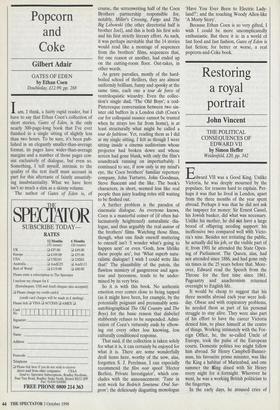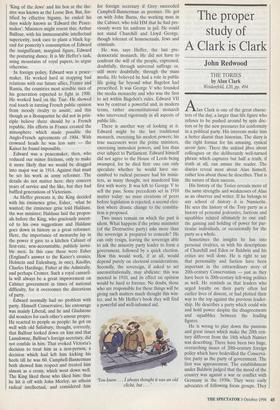Restoring a royal portrait
John Vincent
THE POLITICAL CONSEQUENCES OF EDWARD VII by Simon Heifer Weidenfeld, £20, pp. 342 Edward VII was a Good King. Unlike Victoria, he was deeply mourned by the populace, for reasons hard to explain. Per- haps it was that he lived in London, apart from the three months of the year spent abroad. Perhaps it was that he did not ask the taxpayer for money: Sir Ernest Cassel, his Jewish banker, did what was necessary. Unlike his mother, he did not have a large brood of offspring needing support: his inoffensive two compared well with Victo- ria's nine. Besides not irritating the public, he actually did his job, or the visible part of it; from 1901 he attended the State Open- ing of Parliament. The Queen, alas, had not attended since 1886, and had gone only six times in the 25 years before that. More- over, Edward read the Speech from the Throne for the first time since 1861. Pageantry and anachronism returned overnight to English life.
It would be cheap to suggest that his three months abroad each year were holi- day. Obese and with respiratory problems, he needed them as part of his personal struggle to stay alive. They were also part of his effort to have the career Victoria denied him, to place himself at the centre of things. Working intimately with the For- eign Office, he, the so-called Uncle of Europe, took the pulse of the European courts. Domestic politics too might follow him abroad. Sir Henry Campbell-Banner- man, his favourite prime minister, was like the King a habitué of Marienbad, and one summer the King dined with Sir Henry every night for a. fortnight. Wherever he went, he was a working British politician to the fingertips.
In the early days, he aroused cries of `King of the Jews' and his box at the the- atre was known as the Loose Box. But, for- tified by effective bigamy, he ended his days widely known as 'Edward the Peace- maker'. Ministers might resent this; Arthur Balfour, with his immeasurable intellectual superiority, took care to plant a black leg- end for posterity's consumption of Edward the insignificant, marginal figure, Edward the posturing dunce. It is Mr Heffer's task, using mountains of royal papers, to argue otherwise.
In foreign policy, Edward was a peace- maker. He worked hard at stopping bad relations with our future allies, France and Russia, the countries most sensible men of his generation expected to fight in 1900. He worked hard on the Tsar. He showed real touch in turning French public opinion from moody rivalry to amide, and this though as a Bonapartist he did not in prin- ciple believe there should be a French republic. His efforts in France created the atmosphere which made possible the Anglo-French agreements of 1904. With crowned heads he was less sure — the Kaiser he found impossible.
Edward was a peacemaker, then, who reduced our minor frictions, only to make it more likely that we would be dragged into major war in 1914. Against that must be set his work as army reformer. The details do not matter here: they concern years of service and the like, but they had baffled generations of Victorians.
As Heifer presents it, the King decided with his eminence grise, Esher, what he wanted; the eminence grise told Haldane, the war minister; Haldane laid the propos- als before the King, who graciously assent- ed to his own suggestions and Haldane goes down in history as a great reformer. Here, the importance of monarchy lay in the power it gave to a kitchen Cabinet of first-rate, non-accountable, publicly invisi- ble men. In this case these were Esher (England's answer to the Kaiser's cronies, Holstein and Eulenburg, in one), Knollys, Charles Hardinge, Fisher at the Admiralty, and perhaps Cromer. Such a royal camaril- la will always be a great improvement on Cabinet government in times of national difficulty, for it overcomes the distortions of party.
Edward normally had no problem with party. Himself Conservative, his entourage was mainly Liberal, and he and Gladstone did wonders for each other's amour propre. He reacted to people as people: he got on well with old Salisbury, thought, correctly, that Balfour looked down on him and that Lansdowne, Balfour's foreign secretary, did not confide in him. That evoked Victoria's decision to treat him as a non-person, a decision which had left him kicking his heels till he was 60. Campbell-Bannerman both showed him respect and treated him almost as a crony, which went down well. The King liked those who liked him: thus he hit it off with John Morley, an atheist radical intellectual, and considered him for foreign secretary if Grey succeeded Campbell-Bannerman as premier. He got on with John Burns, the working man in the Cabinet, who told HM that he had pre- viously worn his uniform in jail. He could not stand Churchill and Lloyd George, though tolerant of homosexuals, Jews and criminals.
He was, says Heifer, the last pre- democratic monarch. He did not have to confront the will of the people, expressed, doubtfully, through universal suffrage or, still more doubtfully, through the mass media. He believed he had a role in public life going far beyond what Bagehot had prescribed. It was George V who founded the media monarchy and who was the first to act within Bagehot's rules. Edward VII was by contrast a powerful and, in modern terms, rather unconstitutional monarch who intervened vigorously in all aspects of public life.
There is another way of looking at it. Edward might be the last traditional monarch, exercising his modest powers; his true successors were the prime ministers, exercising immodest powers, and less than ever subject to Parliament. Edward himself did not agree to the House of Lords being swamped, for he died first: one can only speculate whether he would have suc- cumbed to radical pressure had his minis- ters, as many thought, not murdered him first with worry. It was left to George V to sell the pass. Some precedents set in 1910 matter today: no mass creations of peers before legislation is rejected, a second elec- tion where drastic change to the constitu- tion is proposed.
Two issues remain on which the past is silent. What happens if the prime mininster (of the Destructive party) asks more than the sovereign is prepared to concede? He can only resign, leaving the sovereign able to ask the minority party leader to form a government, followed by a quick election. How this would work, if at all, would depend purely on electoral considerations. Secondly, the sovereign, if asked to act unconstitutionally, may abdicate: this was mooted in 1910, and its effect on opinion would be hard to foresee. No doubt, those who are responsible for these things will be giving such matters much thought this win- ter, and in Mr Heffer's book they will find a powerful and well-infomed aid.
`You know . . . I always thought it was an old cliché, but . . . '











































































 Previous page
Previous page